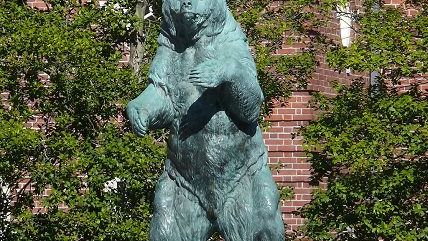Some Feminists Think Stopping Jokes Would Help Stop Rape, But 'Alcohol is Not the Problem'[*]


[*Update: This headline was changed. For a full explanation, scroll to the bottom.]
Reason contributor Wendy McElroy and liberal feminist Jessica Valenti debated campus sexual assault, rape culture, and due process at Brown University on Tuesday afternoon. The debate preemptively generated student protests, alternative events, and even a statement from Brown President Christina Paxson.
These reactions had one thing in common: disdain for McElroy's perspective that rape is the work of a small number of serial predators, rather than a cultural phenomenon. Paxson lamented that view in her campus-wide email, writing, "I disagree. Although evidence suggests that a relatively small number of individuals perpetrate sexual assault, extensive research shows that culture and values do matter."
McElroy's contrarian perspective on rape was in fact so traumatizing for certain members of the campus that they felt they needed to create alternative events. Some students organized a "BWell Safe Space." According to The Brown Daily Herald:
Students who may feel attacked by the viewpoints expressed at the forum or feel the speakers will dismiss their experiences can find a safe space and separate discussion held at the same time in Salomon 203. This "BWell Safe Space" will have sexual assault peer educators, women peer counselors and staff from BWell on hand to provide support.
No student should feel the need to be protected from an opinion. But those who sought further insulation from McElroy's perspective were invited to attend another alternative event, which promised "The Research on Rape Culture." Samantha Miller of the Foundation for Individual Rights in Education explained why this nonsense is insulting to students, as well as the debate participants:
Given the debate organizers' prior arrangements to provide support to anyone who actually felt the need for it, Paxson's choice to counterprogram the event makes little sense in terms of "emotional safety." But it makes all the sense in the world if you assume the real goal is to provide an intellectual cocoon for students—an effort to create a ideological bubble on campus in which students' beliefs will be free from challenge.
It's a miracle the debate even took place at all, considering how allergic Brown seems to be to constructive discussion of controversial topics, but McElroy and Valenti were able to make their points. McElroy's main argument, according to The Herald:
McElroy said rape culture exists in places like parts of Afghanistan where "women are married against their will" and "murdered for men's honor" but not in North America, where "rape is a crime that's severely punished."
What's more, those who politicize rape and assert the existence of rape culture imply that all men are guilty or that the accused do not deserve due process, McElroy said.
It is unacceptable that men can now be disciplined for rape through college hearings based on a preponderance of evidence rather than the traditional criminal justice standard of guilt beyond a reasonable doubt. "Let's not build justice for women on injustice for men," McElroy said, closing her talk.
And Valenti's:
Valenti never tackled the question of whether a preponderance of evidence or guilt beyond a reasonable doubt should be the standard for conviction of men in college hearings, but she did talk about other aspects of sexual assault as it relates to college campuses, such as the fact that alcohol plays a role in most sexual assault incidents.
"Alcohol is not the problem," Valenti said, chuckling at the notion. "What we need to discuss is the way rapists use alcohol as a weapon to attack and then discredit their victims." Rapists benefit from others' insistence that a victim's inebriation is to blame for his or her assault, she added.
Both speakers addressed how students might move forward in eliminating rape and sexual assault on campus.
"Stopping someone from telling a rape joke or saying they got 'raped' by a test" would be a start, Valenti said, but she also urged students to hold university administrators responsible for addressing rape on campus.
Since the college already saw fit to rebut McElroy, I will only deal with Valenti. I find her view on rape not only misguided, but positively deleterious to the cause of lessening sexual assault. The idea that stopping someone from telling a joke is "a start" to preventing rape is utter nonsense. People jokingly say, "you're killing me," when they don't get what they want; it doesn't mean they anticipate being murdered. When I say that I was beaten up in an argument, I don't mean that I suffered physical pain. Professing to have been "raped by a test" may be an off-color remark, but it has nothing to with actual sexual assault. Pretending otherwise is ludicrous.
Valenti's cavalier attitude about alcohol abuse is even worse. No one paying serious attention to the campus rape problem could conclude that "alcohol is not the problem." Binge drinking and alcohol-induced incapacitation are the conditions under which campus rape occurs. In fact, Valenti knows this, since she admits that alcohol is the rapist's weapon of choice. A teen culture of responsible alcohol consumption would be the best deterrent to sexual assault, and we should be discussing strategies for fostering that (like lowering the drinking age!). Telling students that dangerous drinking is just random some side effect is not merely dishonest, but actually dangerous.
Only in the warped world of the modern college campus—where protecting students' delicate feelings and upholding liberal orthodoxy is more important than giving them the truth about rape and alcohol abuse—could Valenti's views escape criticism while McElroy's earned an official condemnation.
Updated at 1:05 p.m. ET: Valenti tells me on Twitter that my headline is a distortion of her position and that she never asserted rape jokes cause rape. I based my headline on The Brown Daily Herald's news story, which reported:
Both speakers addressed how students might move forward in eliminating rape and sexual assault on campus.
"Stopping someone from telling a rape joke or saying they got 'raped' by a test" would be a start, Valenti said, but she also urged students to hold university administrators responsible for addressing rape on campus.
It seemed to me that Valenti was saying that if we want to reduce sexual assault on campus, we should start with the rape jokes.
She declined to speak with me further about her piece, but did provide the text of her speech, which can be viewed here:
So "social license to operate is foundational to rape culture," and "stopping someone when they are telling a rape joke," weakens that social license.
To my eyes, that's a confusing way of saying that abolishing rape jokes is what we should be doing to stop rape. But I have amended the headline to more perfectly encapsulate exactly what Valenti said, based on her prepared remarks rather than the news article.


Show Comments (370)